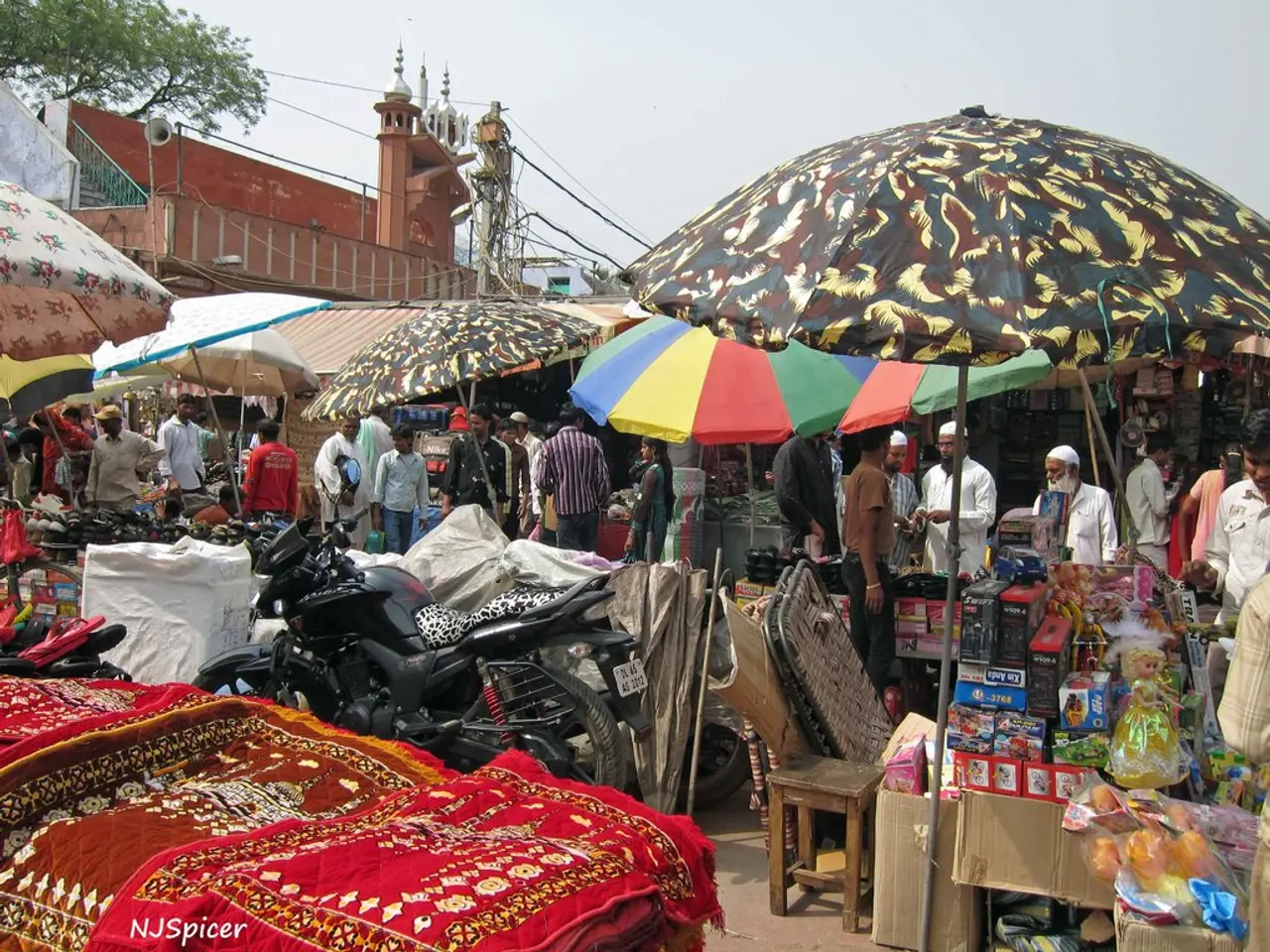Public Prohibition of Muslim Festivities in Open Areas Revives Discussion on Religious Liberty in Jumilla
In the southeastern town of Jumilla, located in the region of Murcia, Spain, the current status of religious freedom for Muslim communities is under dispute. The controversy began when a ban on the use of public facilities for Muslim religious festivals was proposed by the far-right Vox party and later amended and approved by the conservative People's Party (PP) governing Jumilla [1][2][4].
This ordinance prohibits municipal sports centers from hosting cultural, social, or religious activities deemed "foreign to the City Council." The ban mainly affects the local Muslim community's celebrations of Eid al-Fitr and Eid al-Adha, which have traditionally been held in these public spaces [1][4].
The Spanish government has intervened, ordering Jumilla to rescind the ban, condemning it as discriminatory and unconstitutional under Article 16 of Spain's Constitution, which guarantees freedom of religion [2][4]. Madrid’s ministers have publicly criticized the local measure, emphasizing that freedom of worship cannot be selectively granted, and calling on the municipality to retract and apologize for the decision [2][4]. The government has given the town council one month to comply, warning of potential further legal action if the ban is not lifted [4].
The Spanish Episcopal Conference and other religious organizations, including the Federation of Jewish Communities of Spain, have strongly denounced the ban as a violation of fundamental religious rights and as discriminatory [1][3][4]. They frame the issue as an infringement not only against Islam but against democratic principles of religious freedom applicable to all faiths and non-believers [1][3][4].
The editorial in El País, a leading Spanish newspaper, criticised the approved measure for hindering religious freedom and freedom of worship [1]. Similarly, ABC, a conservative newspaper, criticised the measure, stating that it is not a threat to "national identity", but rather the situation of women, the education of girls, forced marriages, and hostility towards freedoms in Islam [1].
Conversely, Vox's leadership has criticized the bishops’ defense of the Muslim community, reflecting a broader political tension between far-right anti-immigration stances and constitutional protections [1]. The local PP leadership has defended the measure as a way to preserve "cultural identity" and maintain community values without explicitly targeting any religion [1].
The Spanish Islamic Commission has not yet issued a statement on the Jumilla case but has spoken out against hate speech and aggression against Muslims and mosques in the past [1]. The Federation of Evangelical Religious Entities of Spain (FEREDE) has expressed concern over the motion passed in Jumilla, arguing that attempting to reduce religious freedom to the strictly private sphere or to specifically religious premises ignores its true legal and constitutional scope [1].
In a debate re-opened on religious freedom in Spain, several Spanish newspapers have made the issue their front-page news [1]. An article in Evangelical Focus criticised the measure, stating that it is unreasonable to single out a particular community for its known and practised customs [1]. Xesús Manuel Suárez, the secretary general of the Spanish Evangelical Alliance, delved into the debate on the authorities' understanding of the concept of secularism, arguing that the separation of church and state must leave the doors of the public square open to all beliefs and non-beliefs [1].
Suarez also wished Muslim communities in Spain would publicly advocate for the same religious freedom and right to use public facilities in Muslim-majority countries [1]. In response, Monir Binjilon, president of the Spanish Federation of Islamic Religious Entities (FEERI), stated that obstructing religious freedom is a "serious crime," describing it as racism and Islamophobia [1].
In summary, the ban on Muslim religious festivals in Jumilla remains legally contested and politically controversial, with the national government and religious authorities advocating for the restoration of religious freedom, while local Vox and PP political forces have supported and justified the restriction. The resolution depends on Jumilla’s compliance with the national government's order to repeal the ban [1][2][4].
[1] https://www.elpais.com/sociedad/2021-06-07/el-ayuntamiento-de-jumilla-prohíbe-la-celebración-de-fiestas-musulmanas-en-los-centros-de-deporte.html [2] https://www.abc.es/sociedad/abci-jumilla-proh-celebraciones-religiosas-musulmanas-centros-deportes-202106071040_noticia.html [3] https://www.elpais.com/sociedad/2021-06-07/el-consejo-episcopal-de-espana-expresa-su-solidaridad-con-la-comunidad-musulmana-de-jumilla.html [4] https://www.elpais.com/sociedad/2021-06-08/el-gobierno-exige-que-jumilla-revoque-la-prohibicion-de-celebrar-fiestas-musulmanas-en-centros-deportivos.html
Read also:
- Court petitions to reverse established decision on same-sex marriage legalization
- Commemoration of 200 Days of American Resurgence Unveiled
- Minister Bärbel Bas expresses doubts about her tenure as a minister following a recent interview during the summer.
- Politicians from both Republican and Democratic parties are urging President Trump to maintain the security agreement with Australia and the United Kingdom.








